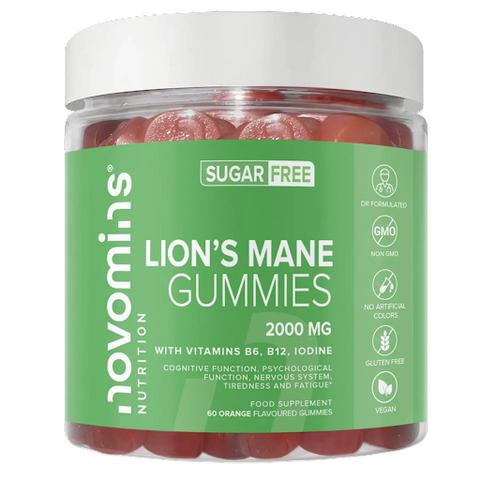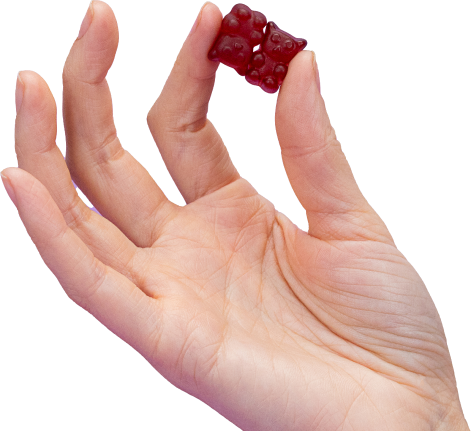Whether your goal is to perform daily tasks more efficiently or boost your mood, more and more people are realising that knowing when to take lion’s mane helps you to stay at the top of your game.
Lion’s mane (hericium erinaceus) is a functional nootropic mushroom which can be taken as a capsule, powder, extract, tea, coffee or even a Lion’s Mane 2000 mg gummy.
Since January 2016, global Google web searches for the term ‘lion’s mane’ have increased by 1,285%. This sharp rise in popularity is best explained by increased discussion around its promising health benefits, especially for the brain.
According to a 2023 study by Sarah Docherty, lion’s mane lowered stress levels and improved cognitive function, mood and performance speed in a group of healthy young adults in just 28 days.
Whether your goal is to feel better or improve focus, knowing exactly when to take lion's mane helps reap its benefits. This article will discuss exactly how to take lion’s mane mushroom pills and other forms of the supplement in your daily routine.
What is Lion’s Mane?
Lion’s mane is a large, edible mushroom which looks a little like a pom-pom. The hype around lion’s mane isn’t for its appearance, however. It’s because its visible fruiting body (mushroom) and mycelium (a root-like structure) contain health-promoting compounds such as hericenones and erinacines.
Lion’s mane contains anti-inflammatory properties and promotes nerve growth. These two things can help to boost your mood, memory and performance, as well as potentially treating symptoms of Alzheimer’s and Parkinson's disease, according to the Journal of Restorative Medicine.
Some people have turned to lion’s mane in the hope of relieving ADHD symptoms too. However, no clinical trials have been carried out on the effect of lion’s mane on adults or children with ADHD.
When to take Lion’s Mane
|
Product Types |
Features |
Dosage |
When To Take |
|
Capsules |
Tasteless capsule |
Dosage: 1000 - 3000 mg per day Microdose: 500 - 1000 mg |
Morning with a glass of water, ideally after breakfast |
|
Powder |
Savoury powder |
1000 mg - 2000mg per serving |
Morning, mixed into a hot drink, soup or smoothie |
|
Gummies |
Sweet and chewable |
1000 - 2000 mg per serving |
Morning, after breakfast |
|
Extract or tincture |
Concentrated liquid form |
800 mg - 2000 mg per 2 ml serving |
Morning, added to a drink or placed under the tongue |
|
Coffee |
Coffee blend |
500 mg - 2000 mg per serving |
Morning or early afternoon |
|
Tea |
Tea blend |
Up to 2000 mg per 2g serving |
Morning or early afternoon |
Description: Table explaining when to take Lions Mane based on the different delivery methods
There is no clear answer to the question of when to take lion’s mane. However, in Docherty’s successful 2023 study, healthy adults were instructed to take three 600mg lion’s mane capsules in the morning after a breakfast of toast or cereal.
Since the intended purpose of taking lion’s mane is to boost cognitive function, particularly memory and performance, it also adds up that the best time to take it is in the morning or early afternoon.
Consistency is the most important thing when taking a new supplement. In most clinical trials, the extract was administered daily for an extended period such as 28 days, giving an indication of how to use lion’s mane.

Buy Novomins Lion’s Mane Gummies now
How to Take Lion’s Mane Gummies
Lion’s mane gummies take away the chore of taking a supplement and turn it into something fun and delicious. All you need to do is chew and swallow, just as you would with a sweet from the corner store.
Novomins’ Lion’s Mane 2000mg gummies are orange-flavoured and blended with vitamins B6, B12 and iodine for additional cognitive support.
“I formulated our 2000mg Lion’s Mane to be high strength, using the finest ingredients known to promote neuronal development and reduce stress,” explains Akil Memishi, BSc Hons Pharmacology & Neuroscience and Novomins’ Founder and Formulator.
Typically, one person will take one or two gummies daily in the morning or early afternoon.
How to Take Lion's Mane Capsules or Tablets
As with any tablet, lion’s mane capsules should be swallowed whole with a glass of water.
When it comes to when to take lion’s mane pills, tablets or capsules, online reviews compare consuming lion’s mane tablets and capsules to taking caffeine, making the morning or early afternoon a good time to take it.
How to Take Lion's Mane Powder
Lion’s mane powder should be mixed or blended with drinks such as tea, coffee or a smoothie. Its mild, savoury taste makes it a good addition to savoury soups or stews.
How to Take Lion's Mane Extract or Tincture
Lion’s Mane extract (or lion’s mane tincture) is a concentrated liquid form of the mushroom. Following the manufacturer's instructions, it is usually administered either by adding one or two droplets to a drink or by placing the dose under the tongue.
How to Take Lion's Mane Coffee
Lion’s mane coffee is a blend containing lion’s mane and other ingredients such as coconut oil, ashwagandha, cacao or Rhodiola rosea extract. Its mild flavour is not at all overpowering. Lion’s mane coffee can be prepared as an espresso or by using the filter method or a cafetiere.
How to Take Lion's Mane Tea
Most tea blends feature between 500 mg and 2000 mg of lion’s mane combined with other herbal ingredients for brain health.
Considerations when taking Lion’s Mane
Studies on lion’s mane suggest that supplements are generally well tolerated by healthy adults. Very few side effects have been reported, according to the Journal of Restorative Medicine.
However, here are a few things you might want to consider before taking lion’s mane in any format.
Diet
Generally speaking, there’s no need to fiddle with your diet when taking lion’s mane. It is plant-based, so it can easily be incorporated into a vegan or vegetarian diet.
However, if you’re diabetic, you may need to alter your diet to take lion’s mane. The mushroom may produce a moderate anti-hyperglycemic effect, which lowers the level of glucose in the blood, according to the Asian Pacific Journal of Tropical Biomedicine.
Other supplements
Out of the studies available, there are no reports of adverse reactions between lion’s mane and other natural supplements or medicinal mushrooms.
Medications
Lion’s mane should not be combined with immunosuppressant medications. This is because the mushroom may boost immune system activity, according to WebMD.
Those taking diabetic medication should also exercise caution when taking lion’s mane due to its anti-hyperglycemic effect.
If you have any concerns about taking lion’s mane with medications, it’s advisable to speak to a doctor.
Alcohol
There are no studies on taking lion’s mane with alcohol. However, alcohol is known for causing difficulties with problem-solving, decision making and forming memories, as documented by the Alcohol Health and Research World. Therefore, it may cancel out the benefits of taking lion’s mane.
Interestingly, the bioactive compounds in lion’s mane extract may be more helpful than acid-reducing drugs for reducing the size of alcohol-induced stomach ulcers, according to a 2013 animal study.
Expiry date
Lion’s mane supplements should not be taken after their expiry date.
Who Should Not Take Lion's Mane
While lion’s mane is considered be safe for most people, there are some who should not take lion’s mane.
Anyone can experience an allergic reaction to a food or supplement. According to the Cleveland Clinic, those with a mould allergy are more likely to experience an allergic reaction to mushrooms. Anyone with an existing mushroom or mould allergy should avoid taking lion’s mane supplements.
Annals of Allergy, Asthma and Immunology reports of one anaphylaxis case following the consumption of lion’s mane. The symptoms included abdominal pain, diarrhoea, hives and swelling, which appeared within minutes of consumption.
There are no clinical studies on the effect of lion’s mane on pregnant women.
Buy Novomins Lion’s Mane Gummies now
What does the research say about lion’s mane?
So far, the research on lion’s mane is very promising for brain health and cognitive function.
Firstly, there’s Sarah Docherty’s study in 2023, which observed that lion’s mane improved performance and lowered subjective stress levels in a group of 41 healthy adults compared to a control group.
Researchers administered three 600 mg lion’s mane capsules daily. They were taken after breakfast, suggesting this was an opportune time to take lion’s mane.
Similarly, most studies on lion’s mane provide participants with 1000 to 2000 mg split between one to three microdoses per day for at least 28 days, suggesting this is an optimal dose and time period to see the substance’s benefits
Lion’s mane also shows potential for improving the symptoms of Alzheimer’s and Parkinson’s diseases due to its anti-inflammatory properties and ability to promote nerve growth, according to the Journal of Restorative Medicine.
A report by Mendel Friedman also found that collective research shows lion’s mane has antibiotic, antidiabetic and antifatigue qualities, as well as the potential to improve anxiety, cognitive function and depression.
Another interesting study by Ching-Liang Hsieh and others shows promise for overweight people suffering from depression, anxiety or sleep disorders. After eight weeks, those who took supplements exhibited fewer depressive or anxious disorder symptoms than at the beginning.
Most of these studies have been performed on humans with existing cognitive impairments or animals, so more studies are needed to truly understand the potential of lion’s mane supplementation.
Incorporating lion’s mane into your daily routine
Incorporating lion’s mane into your daily routine is easy when you know how. Taking the supplement with breakfast or a morning drink is usually more than enough to create the habit.
If you’re prone to forgetting to take supplements, try leaving the supplements in a visible place or setting an alarm.
When is Best to Take Lion's Mane?
There is no concrete evidence of a “best time” to take lion’s mane.
However, the beginning of the day seems the most logical option to take advantage of the mushroom’s potential to boost your performance, memory and mood — and recent clinical studies seem to take the same approach.
Remembering to take your lion’s main supplement is one of the main challenges, and the best way to take lion’s mane is to be consistent. That’s where Novomins’ Lion’s Mane 2000mg Gummies come in.
The orange-flavoured gummies are far more memorable than a bland capsule, making them easier to incorporate into your daily routine.
Novomins produces gummy supplements which are not only high-quality but also delicious. Our products are all third-party tested and recommended by health professionals, including a team of doctors, scientists and nutritionists.
Click here to browse the Novomins range.
FAQs
How much lion's mane should you take a day?
A typical daily dose of lion’s mane is 2000 mg, although some people may choose to begin with a smaller dose of 1000 mg per day.
What time of day should you take lion's mane?
The consensus is that lion’s mane should be taken in the morning after or with breakfast due to its potential to promote productivity, mood and memory.
Is it bad to take lion's mane before bed?
Lion’s mane can be taken before bed. However, you may not fully benefit from the supplement, which is intended to increase productivity and performance during the day.
Should you take lion’s mane every day?
Lion’s mane should be taken at the same time every day for an extended period to feel its full benefits.
Sources:
- Sarah Docherty, The Acute and Chronic Effects of Lion’s Mane Mushroom Supplementation on Cognitive Function, Stress and Mood in Young Adults: A Double-Blind, Parallel Groups, Pilot Study
- Journal of Restorative Medicine, Volume 6, Number 1, 12 March 2017, pp. 19-26(8)
- Asian Pacific Journal of Tropical Biomedicine, Anti-hyperglycemic property of Hericium erinaceus – A mini review
- WebMD, Lion's Mane Mushroom - Uses, Side Effects, and More
- Alcohol Health and Research World, Alcohol-Related Cognitive Impairments
- Evid Based Complement Alterate Med, Gastroprotective Effects of Lion's Mane Mushroom Hericium erinaceus (Bull.:Fr.) Pers. (Aphyllophoromycetideae) Extract against Ethanol-Induced Ulcer in Rats
- I-Chen Li and others, Prevention of Early Alzheimer’s Disease by Erinacine A-Enriched Hericium erinaceus Mycelia Pilot Double-Blind Placebo-Controlled Study
- Ching-Liang Hsieh, Hericium erinaceus Improves Mood and Sleep Disorders in Patients Affected by Overweight or Obesity: Could Circulating Pro-BDNF and BDNF Be Potential Biomarkers?
- Journal of Traditional and Complementary Medicine, Neuronal Health – Can Culinary and Medicinal Mushrooms Help?
- Alcohol Health and Research World, Alcohol-Related Cognitive Impairments
- Cleveland Clinic, Mold Allergy
- Annals of Allergy, Asthma and Immunology, Dangers At The Dinner Table - A Report of Anaphylaxis to Lion’s Mane Mushroom
- Mendel Friedman, Chemistry, Nutrition, and Health-Promoting Properties of Hericium erinaceus (Lion's Mane) Mushroom Fruiting Bodies and Mycelia and Their Bioactive Compounds




